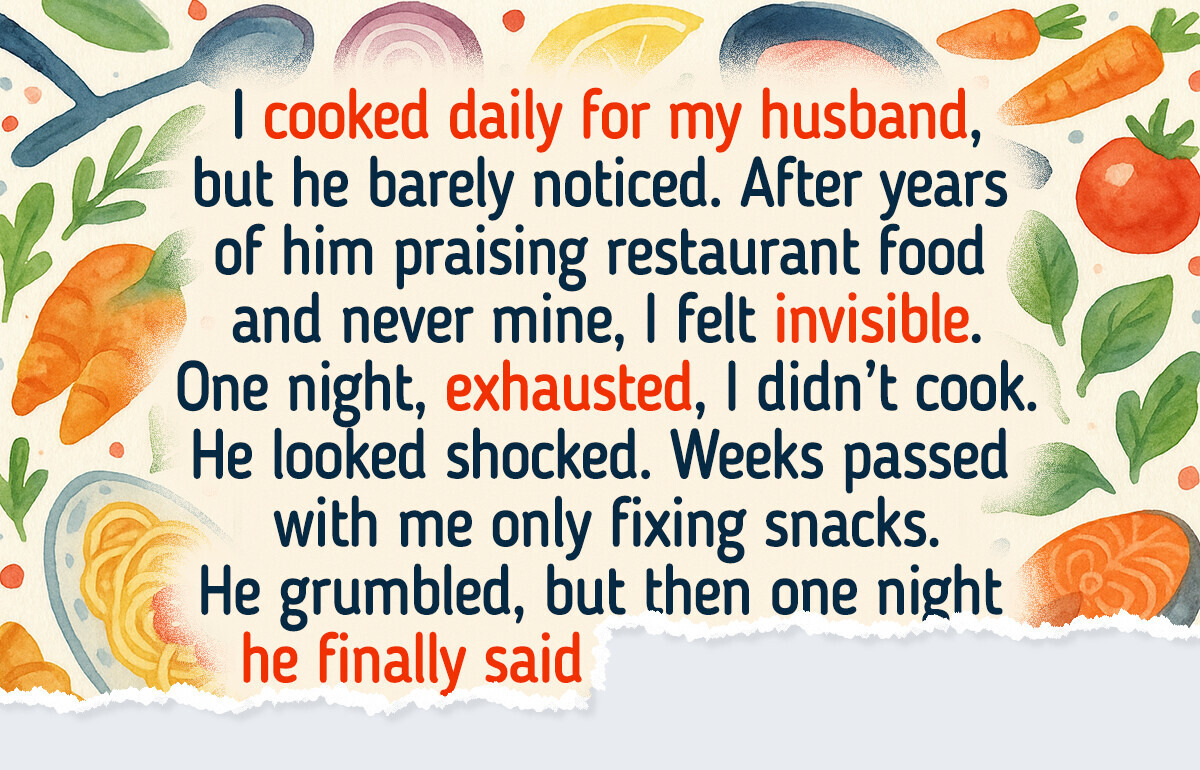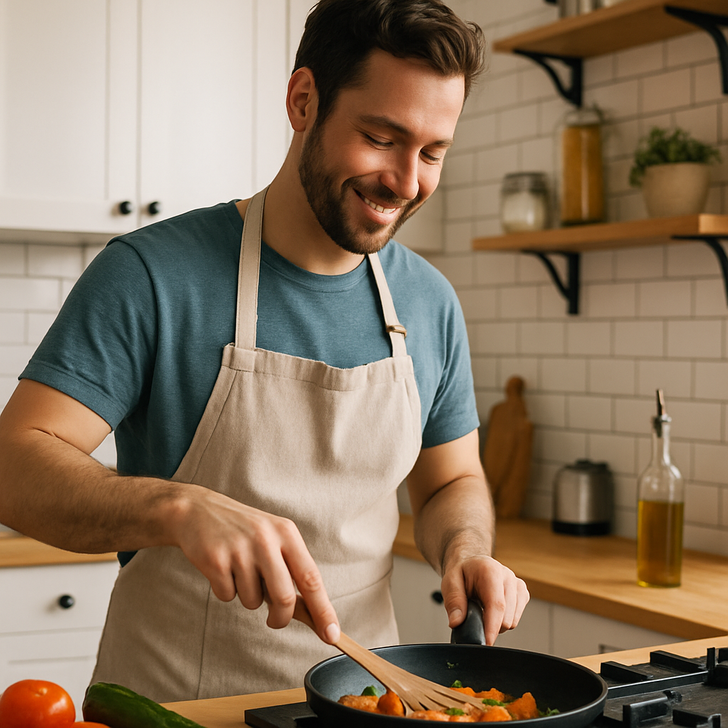What's the saying, 'none so blind as those who will not see ' now finally when it was almost too late he sees.
My Husband Didn’t Help in the Kitchen—So I Taught Him a Lesson He Won’t Forget

Cooking every day can start as an act of love, but when it turns into an expectation without gratitude, it begins to feel like a burden. One of our readers shared how she quietly put down her apron, and what happened next surprised her. Instead of anger, her husband’s reaction revealed something she’d been waiting to hear all along.
Here’s how one small change in her routine transformed her marriage.

Hi Bright Side!
I used to cook every single day for my husband. Breakfast before work, dinner after. He’d eat, sometimes mumble “thanks,” and that was it. No real appreciation.
At first, I didn’t mind — I thought it was just part of being married. But after years of hearing him rave about restaurant meals and never once complimenting mine, I started to feel invisible.
One Friday, after coming home exhausted from work, I just... didn’t cook. I sat on the couch with tea and waited. When my husband asked what was for dinner, I said, “Not tonight. I’m tired.” He looked stunned.
The next few weeks, I kept at it — no cooking, just simple snacks for myself. At first, he grumbled, but then something changed.
One evening, he said, “I never realized how much love you put into cooking until it was gone. I thought food just appeared. I didn’t see the effort — or you.”
I didn’t expect him to say that. It stopped me in my tracks.
Now everything is different. He actually steps into the kitchen on his own, experiments with recipes, and even serves me dinner sometimes. The best part? He finally appreciates not just the meals, but me.
Who’s Really Doing the Cooking? A New Survey Reveals a Surprising Gender Gap.
A global survey has revealed that the gender gap in home cooking is widening again — with women preparing far more meals than men almost everywhere in the world.
According to the annual Gallup and Cookpad survey, women cooked just under nine meals per week in 2022, while men managed only about four. That’s nearly double the workload.
When the survey first launched in 2018, traditional roles were clear, but during the last four years men began cooking more, narrowing the gap. “Every year since the study started, the gap narrowed,” says Andrew Dugan, research director at Gallup. “Until now.”
The latest results show men cooking less than before — about one fewer meal a week on average — while women’s numbers stayed steady. The divide is now back to where it was in 2018.
By contrast, European countries such as Spain, the UK, France, Switzerland, and Ireland show much smaller differences. And there’s one surprising exception: Italy, where men actually cook more than women.
Rethinking Cooking as Shared Work.

Modern energy cooking services create a chance to challenge the long-standing imbalance of domestic labor. Tools like Electric Pressure Cookers (EPCs) can reduce the exhausting, time-consuming burden of daily cooking, improve health and economic opportunities for women, and — perhaps most importantly — encourage men to take part in household responsibilities.
Around the world, women still prepare far more meals than men, with averages showing an extra eight meals per week in many countries in the global South. These patterns are rooted in deeply traditional roles and cultural expectations.
For decades, cooking and other forms of care work have been undervalued because they take place in the “private sphere.” As a result, they are often ignored in policy discussions about energy access, infrastructure — even though these tasks directly shape household well-being and community resilience. Kitchens have long been viewed as spaces where women’s unpaid work goes unseen, yet they remain central to daily survival and social life.
This duality — kitchens as both limiting and liberating — highlights why rethinking domestic energy use matters. By introducing modern technologies and reshaping expectations, households can move toward a more balanced division of labor, where cooking becomes not just a woman’s duty, but a shared responsibility and even a source of pride.
17 Families Who Came Up With Traditions That Are Impossible Not to Love
Comments
good story. really goes to show how much the worklife balance is underappriciated for those who work domestic. not to mention with an increase of both people in a relationship needing to work jobs we're probably gonna be hearing a lot more stories like this in the near future
Related Reads
18 Quiet Acts of Kindness That Became Someone’s Reason to Live

I Refuse to Pay for Everyone Just Because I’m Childfree

14 Stories From Cleaners That Are Wilder Than Any Movie Script

15 Stories That Show Kindness Is a Quiet Language the World Needs

I Refused to Talk to My Parents After They Chose My Ex-Wife Over Me

I Demand That My 16 Y.O. Daughter Pay for Rent and Groceries, Nothing in Life Is Free

17 Moments That Prove Kindness Is the Strongest Payback

10 Hospital Workers Who Prove Kind Heart Is a Powerful Medicine

I Refuse to Return to the Office After My Coworker’s ‘Prank’ Revealed His Darkest Secret

I Thought My Ex Was Finally Stepping Up for Our Son—Then I Discovered the Humiliating Truth

14 Stories That Prove Kindness Doesn’t Need a Spotlight to Shine

I Refuse to Let My Inheritance Go to Family Members Who See Me as a Personal Bank
